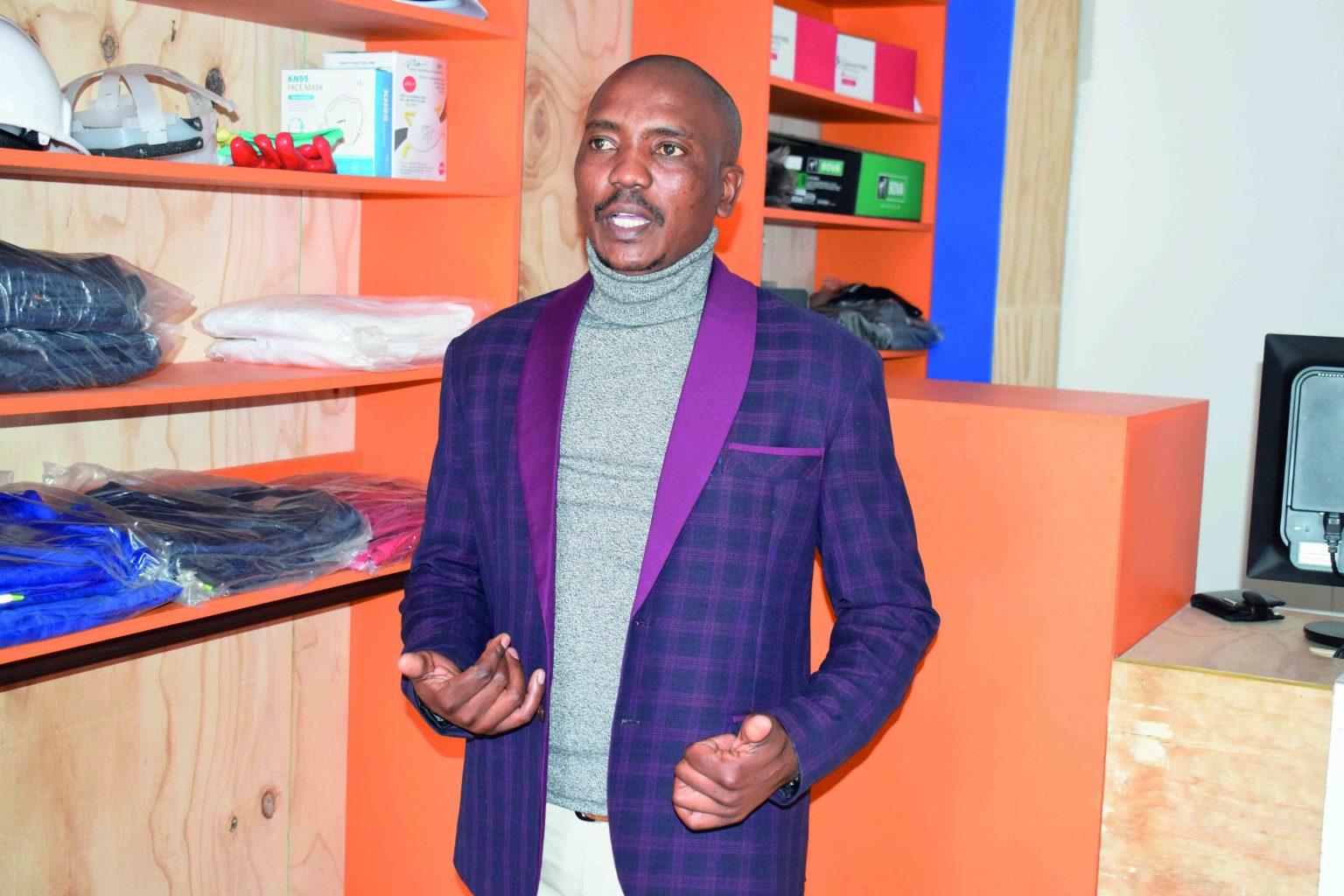Africa-Press – Lesotho. LIKE other young boys, Tšepo Johane trekked from Thaba-Tseka to Maseru in search of employment after completing high school. The businessman’s big break came from an unexpected source: a job as a security guard at a textile firm at Ha-Thetsane.
“Working as a security guard in the firm was a blessing in disguise,” said the 44-year old who now has his own company.
Johane is the founder and director of Johane Garments (Pty) Ltd, which specialises in manufacturing of protective clothes. The factory counts big companies in South Africa and Lesotho among its customers.
It all started with poor Cambridge Overseas School Certificate (COSC) results where he obtained General Certificate of Education (GCE) in 1998. While working at the firm Johane realised that the cloth pieces classified by the firms as waste were still in good shape.
“I would collect those waste to cut them into final clothes,” he says, adding that since he had no sewing machine, he would sew using the hand needle.
Johane says he did not have any idea of what he was doing but at the end, he would come up with a top and a trouser. “One woman was so surprised to see what I had done using a hand needle,” he recalled, adding that she could not stop marvelling at his work.
“She realised the potential in me.
” They struck an agreement. She would make dresses and Johane would sell them to workers at the factory where he was still a security guard.
Business flourished and he would make about M6 000 monthly. “However, i realised that there were designs that my business partner could not make and customers were no longer happy,” he said.
Instead of whining, he saw it as an opportunity. Since he had no experience of sewing and cutting, he would move around in the firm during the day to see how the professionals did it.
Still, he wasn’t good at sewing. Johane said he then approached one of his relatives at Thaba-Tseka who was sewing dresses to teach him. He recalls one Sunday morning when the relative gave him a task.
“Due to limited time she only showed me how to do everything. When she came from the church the dress was perfectly made,” he said. He bought a sewing machine and his journey as an entrepreneur was taking shape.
With his customer base growing quickly due to his creativity, Johane realised he needed to fully focus on his new adventure and he quit his job. He employed two people to help him meet demand.
He said it took him four years to realise the potential in the industry. “I realised that it is not only about sewing the dresses but there are other things which can stir up, not just within the company but also in the economy,” he said.
He added that he wanted to do more and create something big. Johane says he then decided to go to school to upgrade his skills. He tried Lerotholi Polytechnic but the college did not provide him with the part-time courses he needed.
In 2009 Limkokwing University introduced more courses that included Fashion and Apparel into their program. Johane tried his luck. Since his results were not good, he had to use his work to convince college authorities to give him a job.
“The university was so impressed with my work that they enrolled me in one of the classes.
” Johane says he started with a six-month bridging programme before embarking on a three-year programme studying Fashion and Apparel.
At that time, Johane was already operating at one of the buildings at Ha-Thetsane and he had to move into town. He said, as a result, he had to retrench some of his employees and keep the extra machines.
After graduating in 2012, he returned to Ha-Thetsane and started a company that manufactures protective clothing. Johane said a year later when he wanted to register his company, he was obliged to have other directors so he approached Keketsi Monaka and Thomello Pokola to be his business partners.
Johane said the business went south to the extent that sometimes they halt operations because they couldn’t afford rent. “The situation was so bad that we had to sell some of our machines to cover rent.
It took four years for the financial situation to improve,” said Johane. By that time, one of his partners had decided to return to work in the factory firms to earn a living.
Johane hung on. “Since this has been my dream, I could not just abandon it,” he said, adding that he received financial help from his family. “The love in this industry has also held me up,” said Johane, who left no stone unturned in search of help from various government departments.
He said the ministry of trade came to his rescue by lending him a building to operate from. The place was run by a Chinese businessman who incubated him for three years from 2015.
In 2018, he was fortunate to be among people to be allocated space at buildings earmarked for Basotho businesses at Ha-Thetsane industrial estate. Still, business was low and he had lost both his partners who had decided to abandon the project.
He decided to engage experts so that they could come up with different skills to improve the running of the business. “Since that time the business has started booming,” he said.
In fact, business is so good that the company has had to hire more workers. The business now has about 43 workers and 53 machines. A month ago, the business opened a new retail branch in town where he hired four people.
Johane said he is now supplying protective clothing to three big South African companies that have about 500 workers. He said apart from walk-in customers he has about 12 companies that rely on his company for protective clothing.
Johane also mentioned that he was fortunate to be granted the opportunity to go to China for a two months course to enhance his skills. He said the ministry of gender also recognized his potential and donated a machine worth M450 000 to his business.
Johane said the business has benefited the community through job creation. It has also taken him on a rags-to-riches path. He now owns three cars and he is working on developing his properties.
Johane says one of his goals is to supply overseas customers. “I want to sell my brand internationally. We are already established here, now it’s time to look at becoming a global brand,” said. Johane, who also dreams of owning at least three factories that can create more than 1 500 jobs for Basotho.
For More News And Analysis About Lesotho Follow Africa-Press






